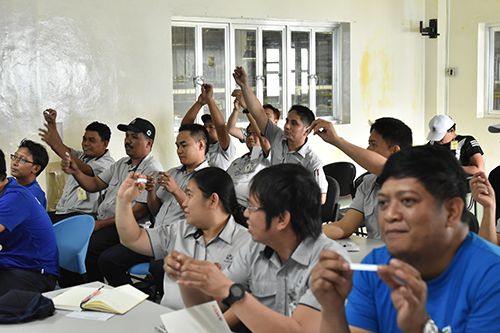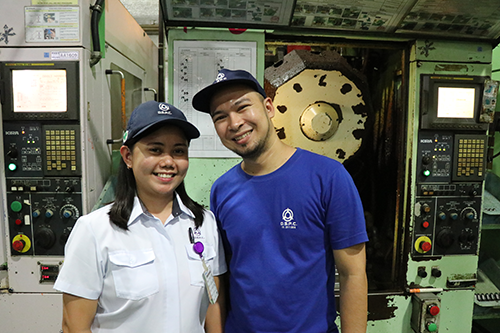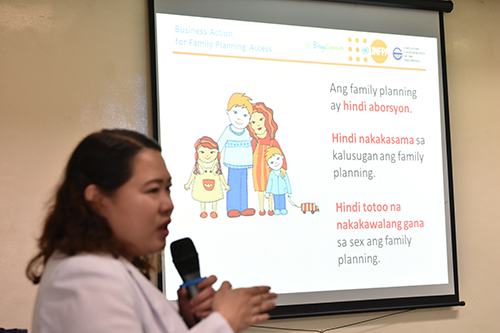News
Companies reach more than 1 million with family planning information in Philippines
- 18 July 2018
News
LAGUNA, Philippines – “I used to believe that jumping after sex prevented pregnancy,” said Phoebe Tamondong, 25, in Laguna Province, in the Philippines. She is not alone – these and other family planning myths are widespread.
Ms. Tamondong learned that jumping offers no protection against pregnancy only after giving birth to her first child three months ago. This fact and many more were provided at a family planning information session she attended at her workplace, Daiwa Seiko Philippines Corp.
UNFPA is partnering with Daiwa Seiko to supply reproductive health information to staff, part of efforts to expand access to voluntary family planning services.
“Before the information session, I didn’t have a full understanding of family planning. Now I am better informed,” Ms. Tamondong, a human resources assistant, told UNFPA.

In the Philippines, only 41 per cent of women in a marriage or union are using a modern method of contraception, according to United Nations data. Among unmarried, sexually active women, 49 per cent have an unmet need for family planning, a 2017 survey showed.
UNFPA worked with the Employers Confederation of the Philippines to implement the programme at Daiwa Seiko.
UNFPA trained staff at the company to conduct accurate, sensitive family planning information sessions. Participation in these sessions is entirely voluntary. Contraceptives are also available through the company nurse; whether employees choose to use these services is kept confidential.
“When I was child, family planning wasn’t very well known, and growing up was very difficult for me and my five siblings,” said Brandon Manaig, 31, a production worker at Daiwa Seiko.
He and his wife, who also works at the company, had already been using family planning, but they say the information session taught them about the variety of contraception choices available. They are now considering their options.
“My family’s life has improved thanks to family planning. My wife and I are able to apply what we’ve learned about spacing our two children,” he added. “It feels good to be able to provide for my children, and I’m happy they don’t experience the hardship I did.”

Daiwa Seiko is one of 13 companies that UNFPA has partnered with to expand access to family planning services in the workplace.
Collectively, these private-sector partnerships have been able to reach 1.4 million individuals with family planning information since 2015.
“The private sector is an important partner in expanding access to voluntary family planning, which is one of the most effective ways to stop the cycle of poverty for families and communities,” said Klaus Beck, UNFPA’s representative in the Philippines.
The programme emphasizes that family planning is each individual’s right and choice.
But the businesses are also seeing benefits.
“We observed that a significant number of employee absences were due to unplanned pregnancies, which impacts our productivity,” said Cherry Lynn Leynes, the company nurse at Daiwa Seiko.
“Providing our employees with family planning information sessions not only empowers them to make informed choices and decisions, but also helps the company as well,” she added.

UNFPA has even developed a return-on-investment tool that helps companies estimate the financial returns of providing voluntary family planning services in the workplace.
Learning about family planning has helped Ms. Tamondong make healthier choices.
After her baby was born by Caesarean section, the doctor recommended she wait a few years before conceiving again.
“My husband and I decided to use modern family planning after the birth of our first child to safeguard my health,” she said.
Her decision was reinforced by what she had learned at her company.
And the rest of her family has been supportive. “My mother reminded me that she did not have the same opportunities that I do, and she encourages me to continue to use family planning so that I can plan the timing and size of my family,” she said.
“I’m very happy with what I’ve learned.”
–Mario Villamor